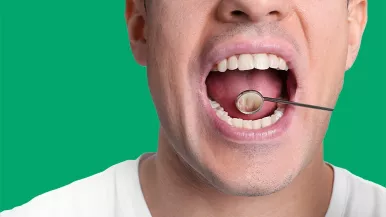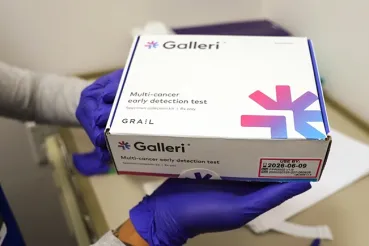When it comes to oral health, most of us are focused on avoiding cavities or banishing bad breath. We don't really think about taking steps to prevent oral cancers.
But according to Samer Al-Khudari, MD, we should. "Unfortunately, there is relatively low awareness about these cancers — including how to prevent and recognize them," says Al-Khudari, a head and neck surgeon at RUSH MD Anderson Cancer Center.
Cancers of the oral cavity (including the lips, cheeks and tongue) and the oropharynx (including the soft palate, tonsils and throat) can crop up in a variety of ways and are not always easy to spot.
"Symptoms vary by the type of cancer," Al-Khudari explains. "Not all patients have pain or irritation. Sometimes the symptoms are barely noticeable in the early stages."
That's a big reason why these cancers often go undiagnosed until the later stages, after they have spread to the lymph nodes
What you need to know about oral and oropharyngeal cancer
Here are a few other important things to know about oral cavity cancer and oropharyngeal cancer:
- In general, men are twice as likely to be diagnosed with these cancers as women.
- The number of patients under 50 years old has been steadily increasing; and sometimes, these cancers occur in young adults in their 20s and 30s.
- Patients who survive a first encounter with the disease have a higher risk of developing a second, related cancer. That increased risk can last for 5 to 10 years.
- Biopsy is the only way to properly diagnose oral and oropharyngeal tumors and lesions.
- Although these various types of cancers can be found in one small area of the body, each type has different causes and treatments.
- Patients on immunosuppression medications — typically those who had an organ transplant — have an increased risk of head and neck cancer.
- Keeping your mouth and throat healthy.
The good news is that even at the later stages, these cancers are still very treatable.
With current treatment advances, survival rates for oral cancers have improved over even a decade ago. In fact, some oropharynx cancers have been found to have to survival rates of 80% to 90% at three years.
And many oral cavity and oropharyngeal cancers can be prevented altogether with sensible self-care and healthy lifestyle choices.
Here, Al-Khudari offers five preventive tips:
1. Steer clear of tobacco.
The longer you've used tobacco and the more often you use it, the greater your risk of oral and oropharyngeal cancers, as well as head and neck cancers.
"Both smoking and smokeless tobacco always play a direct role in causing these cancers," Al-Khudari says.
Chewing, smokeless and snuff tobaccos, which are placed directly in the mouth, can create gray-white ulcers called leukoplakia in the mouth that can become cancerous. Smokeless tobacco also contains chemicals known to damage a gene that protects against cancer.
Rush can help you quit smoking, vaping or using smokeless tobacco. There's more than one effective way to quit — and we'll help you find one that works for you. Learn more.
2. Limit alcohol.
As with smoking, the longer you use alcohol and the amount you drink, the more your risk goes up. That's because alcohol plays a role in changing the body's chemistry to break down its defenses against cancer.
"Alcohol dependence and binge drinking increase a person's risk,” Al-Khudari says. “And excessive drinking and smoking combined has a multiplying effect."
While no alcohol is best, women who choose to drink should have no more than one drink a day, and men no more than two drinks a day.
3. See your dentist regularly.
Very often, dentists and dental hygienists are the first to notice potentially cancerous growths.
"Typically, they catch things really early during routine dental exams," Al-Khudari says. "They can then refer you to an ear, nose and throat specialist, or a head and neck surgeon like myself. If we can confirm the diagnosis and start treatment right away, there's a good chance we can eliminate the cancer."
In addition to visiting the dentist every six months, be sure to brush and floss twice a day — and after meals — to keep your teeth and mouth healthy.
4. Get vaccinated for HPV.
Human papillomavirus (HPV), particularly HPV16, is strongly associated with oropharyngeal cancers, especially those at the back of the mouth.
"Typically, HPV-related cancers are found in men in their late 40s or early 50s," Al-Khudari says. "They tend to have minimal symptoms, like a swelling in their neck that they discover while shaving that doesn’t go away."
The best way to prevent HPV is to get vaccinated before you become sexually active. With vaccines now available that protect against two strains of HPV — recommended for 9- to 26-year-olds — there is hope that the number of cases of these cancers will decrease over time as more people are vaccinated.
HPV is most commonly spread through skin-to-skin contact. And because you can get HPV from a single sexual encounter, Al-Khudari also recommends practicing safe sex.
5. Protect yourself from the sun.
Sun exposure increases your risk for skin cancer and lip cancer, and people who work outdoors with prolonged exposure to the sun’s ultraviolet radiation are more likely to develop both. Everyone should practice sun safety every day.
"Take extra care with your lips. Just as skin can burn easily, the lips are also sensitive to the sun."
Limit sun exposure during the peak hours of 10 a.m. and 4 p.m., use sunscreen and lip balm that is at least SPF 30 and reapply at least every two hours. Lip balm should be reapplied after you eat or drink. Also, wear wide-brimmed hats and sunglasses that shield your face and eyes from the sun.
Symptoms of oral cancer
In general, warning signs of oral cancers include the following:
- A sore in the mouth that doesn't heal.
- Unexpected loose teeth.
- Unexplained bleeding anywhere in the mouth.
- A lump in the neck.
- A mass or thickening in the face, jaw, cheek, tongue or gums.
- A persistent sore or mass in the mouth that causes pain or a poor fit while wearing dentures.
- Difficulty chewing, swallowing or moving the tongue or jaw.
- Persistent bad breath.
- Unexplained weight loss.
If you experience any of these symptoms, Al-Khudari says, visit your primary care doctor as soon as possible. "If it is cancer, the earlier it's diagnosed, the better the chance we can successfully treat it."




